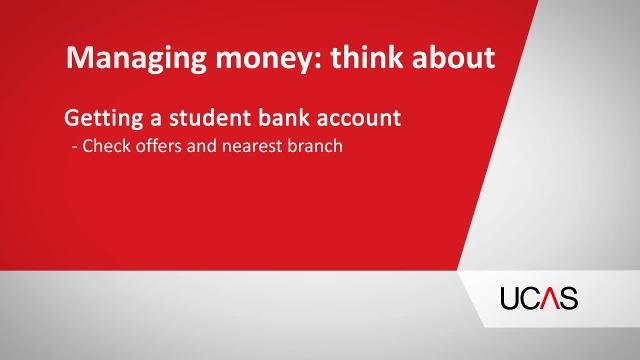Preparing for your studies
Here’s a checklist for you to make sure you’re ready for the start of your course.
Apart from waiting for exam results, check whether you need to do anything else to get your place.
Your university, college, or conservatoire might have given you further requirements, like health or financial requirements, Disclosure and Barring Service (DBS) or Protection of Vulnerable Groups (PVG) checks, or proof of your qualifications.
If you have a student loan or funding, check that all the details are sorted. Before you can be paid your first loan/grant instalment make sure:
- you've submitted your application and all the correct supporting evidence
- your bank details are correct on your application – check your online account
- you've signed and returned your declaration form
- you've registered at your course provider
- your course provider has confirmed your attendance to the Student Loans Company (SLC)
- you’ve allowed a few working days for the funds to be paid into your bank account
Go to our money management area for advice on banking, budgeting, debts, and part-time employment that your course provider may be able to help with.
Many students choose to open a student account with a bank or building society – these are tailored to your needs, and sometimes come with freebies!
Going through Clearing could affect how much student finance you can get – find out what you need to do now.
We've been working with the National Extension College (NEC) to produce a set of study skills guides to help you with higher education study.
Open University Wales, Welsh higher education providers and Welsh Government have also collaborated to assemble a collection of resources to help you get started with all aspects of higher education, wherever in the UK you plan to study.
Do you have somewhere to live?
Finding somewhere you'll be happy to live is an important consideration when you're deciding where you're going to study want to study. There are lots of options – from halls to shared houses.To help you make the right choice, use our accommodation search to research your options and find both uni and private student accommodation.
Also think ahead to insurance, bills, supplies, and a TV licence.
Contact your course provider if you need to arrange accommodation. Even if you’re waiting for exam results, it’s best to check where you could live if you do get the place.
Have you thought about transport?
If you’re moving away, you’ll need to plan your moving day and how you’re getting there, as well as what transport routes you might need to get to your campus.
It’s a good idea to research the area and the societies and events the students’ union provides. Read blogs from other students as well – they might have useful tips for you.
Do you need to get any course materials or do any preparatory reading or research over the holidays?
Stay safe!
It’s important to keep yourself safe wherever you are, but especially so when you’re somewhere new, like at university. Student houses are often brimming with the latest tech and gadgets, making them an easy target for criminals. Stay one step ahead and protect yourself and your stuff at all times! Here are ten top tips from the police for staying safe at uni:
- Make sure your doors and windows are always locked securely. Don’t let opportunist burglars get in!
- Leaving keys, phones, laptops, or any other gadgets out on display can be like an invitation to burglars, so keep them hidden away.
- Not expecting visitors? Don’t answer your door to anyone you don’t know or aren’t expecting!
- Keep a list and photos of your personal property, including serial numbers and descriptions. In most cases, insurance companies won’t pay out unless you can prove your claim, so sending them photos/precise descriptions of your stolen items will help. You can use an ultraviolet pen to mark your property – this is invisible to the naked eye, but can be detected with a special light.
- Always back up your personal data and uni work to a separate source, in case your laptop gets stolen, lost, or broken.
- Heading on a night out? Make sure everyone gets home safely and no-one is left by themselves.
- Each area of the UK has its own safety initiatives, and the police often visit campuses for you to talk to them about any safety concerns you might have.
- Think about your online presence and what other people can see about you. Set your privacy settings accordingly if you only want family and friends to see your posts. Visit www.getsafeonline.org for more guidance.
- Worried your housemate is struggling with drink or drugs? Take a look at www.talktofrank.com for advice.
- Spotted a crime in process? Call 999 straight away! Want to report a crime which has already happened? Call 101.
The different police forces across the UK will be able to provide you with specific advice about the area you’re living in and what they can do to help you. Find your neighbourhood.
More guidance
Check out our transitioning to higher education page for resources around studying, wellbeing, friendships, moving away from home, and more.

